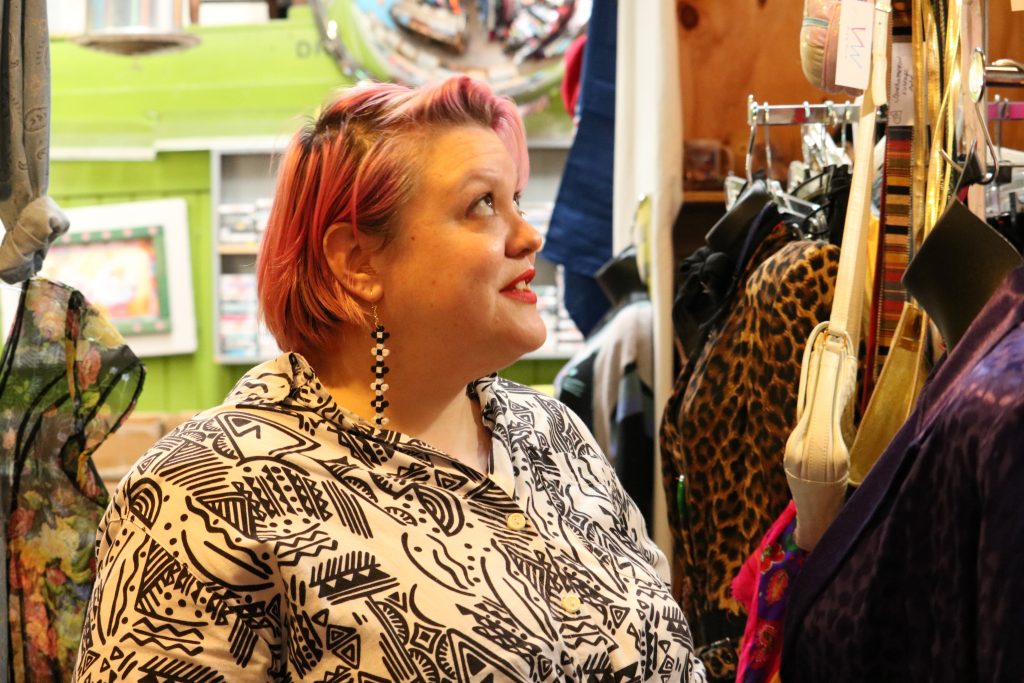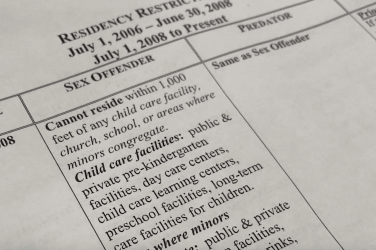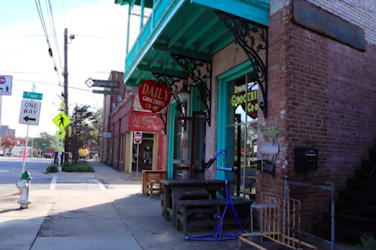From a young age, some choices as basic as color schemes are used to separate one gender from another—blue for boys, pink for girls. In a cultural, societal and political world that is increasingly gender-fluid, however, the line that divides males and females within the fashion sphere has blurred significantly, particularly through the drag community in Northeast Georgia.
Certainly, this change, which has become more open in society, is critical in encouraging LGBTQ+ members to claim their own identities.
Why It’s Newsworthy: As visibility of the LGBTQ+ movement increases, the ways in which gender fluidity is presented to the general public is also expanding to depict flexibility across gender lines.
With increasing visibility of the LGBTQ+ community, especially due to portrayal in mainstream media expanding in the last five years, gender barriers that once existed are being addressed with conversation and action.
Representation Through Fashion
Jennie Cain is an Athens-based fashion influencer and owner of Viva Wild, a fashion company that seeks to promote body positivity through vintage clothing, particularly for plus-sized women. More broadly, Cain believes that in a world of progressing fashion, the sky’s the limit.

“When you see it, you can be it,” said Cain. “If you can see somebody who even has one thing in common with you living their truth, putting out looks, expressing themselves… it can make you want to do the same thing.”
With this new openness about gender expression comes a major hurdle –– the parts of society that still abide by socially-constructed standards of gender often have strong opinions on how one should fit into their traditional gender role.
Fashion not only combats this problem, but also assists in establishing a distinguishable style that is critical to forming one’s identity. In Gender Outlaw, published in 2016, author Kate Bornstein elaborates on this relationship.
“I see fashion as a proclamation of manifestation of identity, so, as long as identities are important, fashion will continue to be important,” wrote Bornstein. “The link between fashion and identity begins to get real interesting, however, in the case of people who don’t fall clearly into a culturally-recognized identity — people like me.”
Individuals such as Cain seek to combat this issue through a more open and diversified approach to fashion, especially when it includes experimentation, risks and sometimes, failure. According to Cain, the key element to its success, however, is the continuation of open expression.
“Beauty comes from within,” said Cain. “And I really admire people who do drag for that reason, because they are literally taking what’s inside their brain and putting it out there for everyone to see.”
Representation Through Education
These sentiments are reflected in the Summer at The Circus program, a study-away bootcamp in Atlanta that is offered through the Grady College of Journalism at the University of Georgia. Over the course of eight weeks, students are encouraged to learn the basics of topics such as graphic design, photography, fashion and more.
“[It] was a very welcoming environment,” said Eliza Meng, a senior entertainment and media studies major from Roswell who attended the program in June 2019. “You could be whoever you wanted.”
While assignments and coursework varied, one aspect of the program included planning and organizing various photoshoots. This involved capturing images that represented drag lifestyle.
“Pictures I saw throughout Summer at the Circus would be men dressing in full women’s outfits and dresses and heels with a full face of makeup,” said Meng. “It was a really impressive photoshoot.”
Meng explained that as the students were encouraged to open up to their own inner creativity, their sense of fashion evolved over the eight weeks to become more bold, colorful and individualized.
“People expressed themselves through what they were wearing, as well as the art they were doing,” said Meng. “The more that we were figuring out our creative style, getting to know each other and getting comfortable in the Creative Circus environment… it was not just reflected in the work we were doing, but in ourselves, as well.”
Representation Through Media
Using media to portray the evolving standards of beauty in relation to gender is becoming more common, due to increased usage of technology and social media.
(Video/Mark Morin)
Mark Morin is an Atlanta-based photographer whose career and intentions with both photography and videography took a major shift after being invited by a friend to one of their drag performances.
“I went out that night planning to make an Instagram story and came home with a set of photos that I am still quite proud of today,” said Morin. “And from there, I just jumped head first into documenting queer culture and really planting roots in the community here.”
(Video/Mark Morin)
Pulling from his own experience in coming out 15 years ago, Morin recognizes the value that comes with creating LGBTQ-inclusive content.
“The more content that we create, the more content that we make, we’re putting it out there for people to discover,” said Morin. “People who aren’t sure who they are, or aren’t sure of themselves, the answer for me is always more content.”
(Video/Mark Morin)
While individuals such as Cain and Morin recognize that there is still progress that needs to be made in normalizing LGBTQ+ culture, the combined forces of fashion and photography ensure that the conversation is progressing.
“As much as there is room to grow for fashion as far as accepting all types, all people, all bodies, all skin-tones, I think that things are so much better than even 10 years ago,” said Cain.
Raini Singleton is a fourth-year majoring in political science and journalism with a certificate in Public Affairs Communications in the Grady College of Journalism and Mass Communication at the University of Georgia.








Show Comments (0)